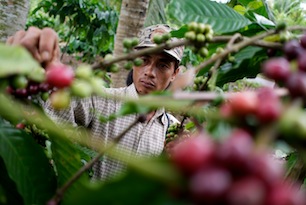Integrated Financial Service to Support Innovative Financing
 Telecommunication services have grown rapidly over the last decade. In Indonesia, mobile phone penetration reached 130% of the total population. However, the use of banking services is still relatively low, with unbanked segment (those without bank account) reached 69% of the total population in 2015. Thus, the Indonesian Government launched the Non-Cash National Movement (GNNT), a program aims to provide access to financial services, such as micro-loans as well as the micro, small and medium enterprises (SMEs).
Telecommunication services have grown rapidly over the last decade. In Indonesia, mobile phone penetration reached 130% of the total population. However, the use of banking services is still relatively low, with unbanked segment (those without bank account) reached 69% of the total population in 2015. Thus, the Indonesian Government launched the Non-Cash National Movement (GNNT), a program aims to provide access to financial services, such as micro-loans as well as the micro, small and medium enterprises (SMEs).
The biggest Indonesian telecommunications provider, Telkomsel, has covered 95% of Indonesian population. Its nation-wide network attracts a national pension bank, PT Bank Tabungan Pensiunan Nasional Tbk (BTPN), to collaborate to support the Government’s GNNT program. Their new integrated financial service connects TCASH (Telkomsel’s mobile financial service) with BTPN’s saving accounts, the BTPN Wow!.
The joint service, called “TCASH-BTPN Wow!”, allows mobile phone users to access BTPN financial services through Telkomsel’s network. It was nationally launched on 18 April 2016 during a community educational event in Ciampea Vilage, Bogor - West Java. This collaboration is expected to help broaden the access to financial services through mobile phones, particularly in the unbanked segment. In the near future, the service will be developed to reach various communities of farmers and other middle income communities, including to 3,000 Islamic boarding schools in Indonesia.
Before it was launched, TCASH–BTPN Wow! was first tested in five cities (Lampung, Bandung, Tasikmalaya, Cirebon, and Bogor). One of the purposes of this trial is to support Nestle’s financing program in providing access to banking services and loans for 20,000 coffee farmers who supply raw materials for Nescafe coffee products. The innovative financing program is expected to provide assistance to farmers in managing their income in a better way, as well as to disburse loans for those who run an intensive farming.
Nestle is the leader of PISAgro’s Coffee Working Group, a program initiated to raise awareness among Indonesian coffee farmers on the need of systematic replanting. The replanting program is done by distributing plant materials to farmers, establishing nurseries, and conducting trainings for farmers. By 2020, Nestle sets the target of distributing 3,8 million plant materials to farmers, followed by farmer trainings to increase productivity and create well-adapted plants that are resilient to climate changes, as well as helping 20,000 coffee farmers to get validated as 4C (Common Code for Coffee Community) farmers who adopt sustainable agricultural practices. In 2015, 18,000 of Nestle’s coffee farmers already validated as 4C farmers, having productivity of 60% above the national average.
Cover photo: Coffee working group